Understanding the Impact of Veneers on your Tooth
Dental Care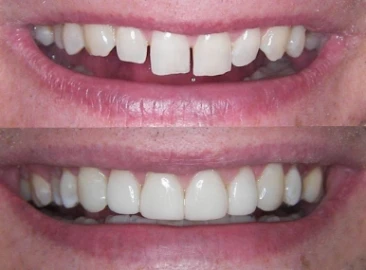
Veneers have become a popular cosmetic dental treatment for individuals looking to improve the appearance of their smile. However, there has been some debate and concern among patients about the potential long-term effects of veneers on natural teeth. Many wonder if the process of getting a Hollywood smile can cause damage or weaken the underlying tooth structure, leading to potential problems in the future.
In this article, we will explore the question: Do Veneers Ruin Your Teeth? We will delve into the science behind veneers, how they are applied, and what potential risks or concerns may arise from this cosmetic procedure. By examining both the benefits and drawbacks of veneers, we hope to provide readers with a comprehensive understanding of the impact this treatment may have on their oral health.
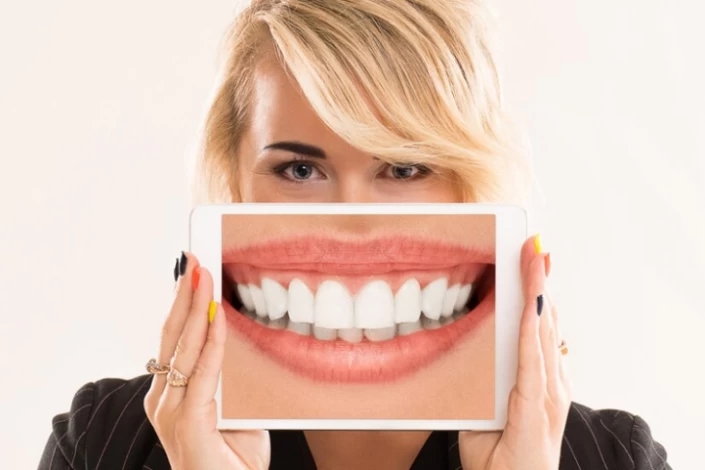
Do Veneers Ruin Your Teeth?
Veneers do not ruin the teeth. They are a minimally invasive cosmetic dental treatment that can improve the appearance of your smile without causing damage to your natural teeth. Veneers are thin shells made of porcelain or composite resin that are custom-designed to fit over the front surface of your teeth. Veneers can effectively address issues such as discoloration, chips, cracks, gaps, and misalignment, providing a natural-looking and long-lasting solution for enhancing your smile.
However, it's essential to note that if not properly applied or maintained, veneers can potentially cause damage. For example, if the veneers are too thick or if there are any issues with their placement, they can create an unnatural bite and potentially lead to tooth or jaw discomfort. Additionally, if the underlying tooth structure experiences decay or damage, it can affect the longevity and appearance of the veneers.
When performed by a skilled and experienced dentist, the placement of veneers should not harm your teeth. In fact, veneers can offer protection to your teeth by providing an additional layer of strength and durability. Proper oral hygiene practices, such as regular brushing, flossing, and dental check-ups, are essential to maintain the health of your teeth and gums, including those with veneers.
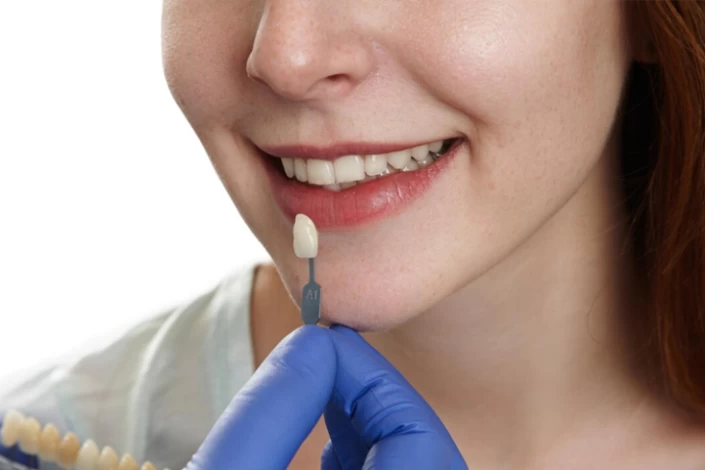
What Do Veneers Do?
Veneers are thin, custom-made shells that are bonded to the front surface of your teeth to improve their appearance. They are typically made from porcelain or composite resin and are designed to match the color, shape, and size of your natural teeth. Veneers can be used to address a variety of dental cosmetic issues, including discoloration, chips, cracks, misalignment, gaps, and worn-down teeth.
With veneers, you can achieve a brighter, whiter smile that looks natural and seamless. Whether you are looking to address specific cosmetic concerns or enhance the overall appearance of your teeth, veneers offer a long-lasting and effective solution. By improving your teeth' color, shape, and alignment, veneers can help you achieve the smile you have always wanted and feel more confident in your appearance.
What Dental Issues Can Veneers Fix?
Veneers can effectively address a variety of cosmetic and functional oral problems, including:
- Discoloration;
- Chipped or cracked teeth;
- Gaps between teeth;
- Misshapen or uneven teeth;
- Worn-down teeth;
- Minor alignment issues;
- Overall smile aesthetics.
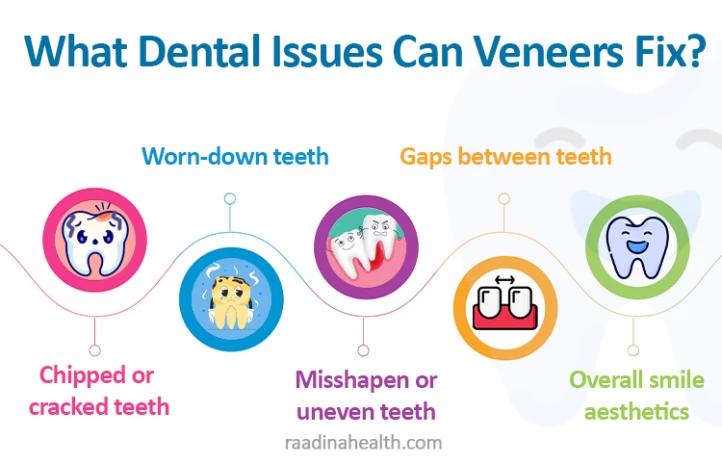
What Happens to Your Teeth Under Veneers?
Apart from the minimal enamel removal, properly fitted and bonded veneers do not negatively impact the supporting teeth. Most patients are unlikely to encounter the issues or concerns they may have heard about, such as unpleasant odors or decay of the natural teeth. In fact, veneers can potentially shield the teeth from decay by reducing the amount of exposed tooth material.
Moreover, the veneer provides an additional protective layer that helps maintain the tooth's integrity for individuals receiving veneers to address damaged or weakened teeth.
It is important to note that while veneers can improve the appearance of your smile and provide additional strength and protection to your teeth, they are not a substitute for good oral hygiene practices. Proper care of your veneers, including regular brushing, flossing, and dental check-ups, is essential to ensure their longevity and prevent any issues such as decay or gum disease from developing underneath the veneers.
How to Prepare the Teeth for Veneers?
The process of preparing your teeth for veneers typically involves several steps to ensure that the veneers fit properly and bond securely to your natural teeth. It includes:
- The first step is to schedule a consultation with your dentist to discuss your goals and expectations for getting veneers. Your dentist will evaluate your oral health, take X-rays, and determine if you are a good candidate for veneers;
- Then, your dentist will create a treatment plan that outlines the number of veneers needed, the desired shade and shape of the veneers, and the overall treatment timeline;
- To make room for the veneers, a small amount of enamel is removed from the front surface of the teeth. This is done to ensure that the veneers do not appear bulky or protrude unnaturally from the teeth;
- After the teeth are prepared, your dentist will take impressions of your teeth to create custom-made veneers that fit perfectly over the prepared teeth. These impressions are sent to a dental laboratory where the veneers are fabricated;
- While waiting for the permanent veneers to be made, your dentist may place temporary veneers on your teeth to protect them and maintain their appearance;
- Once the permanent veneers are ready, your dentist will check their fit and color before bonding them to your teeth using a special dental adhesive. The veneers are carefully positioned and then hardened with a curing light;
- Finally, your dentist may make final adjustments to ensure that they feel comfortable and look natural. This may involve trimming or shaping the veneers as needed.
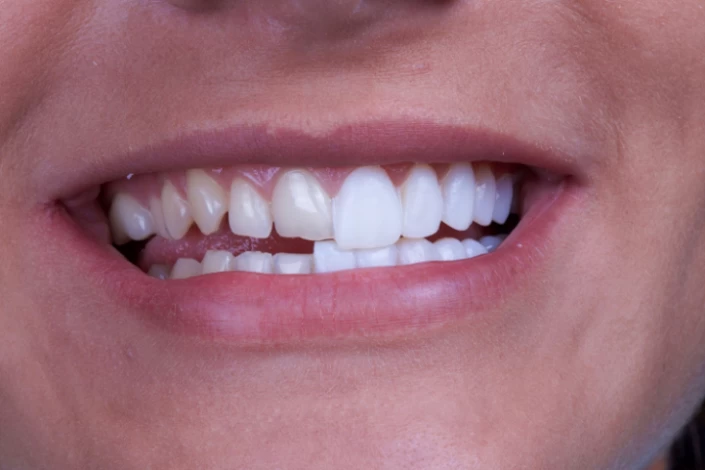
How Veneers Impact Your Tooth Enamel?
The process of getting veneers involves removing a small amount of tooth enamel to make room for the thin porcelain or composite shells that will be bonded to the front surface of your teeth. This removal of enamel is necessary to ensure that the veneers fit properly and look natural.
The amount of enamel that is removed during the preparation for veneers is minimal, typically ½ millimeter. While this does not cause any significant harm to your teeth, it is important to consider that once enamel is removed, it cannot be replaced. This means that your teeth will always require some form of restoration (such as veneers or crowns) to maintain their appearance and function.
Moreover, no-prep veneers are applied without altering the enamel. This type of veneer requires no preparation before application, as the name suggests. They are directly attached to the teeth without removing any enamel. While these veneers are simpler to apply and more cost-effective, they may not have the same longevity as other types.
What Are the Pros and Cons of Veneers?
The advantages and disadvantages of veneers are as follows:
Pros of Veneers
- Improved appearance;
- Durability;
- Being Stain-resistant;
- Minimal tooth preparation;
- Having natural-looking results.
Cons of Veneers
- High Cost;
- Irreversibility;
- Increased Sensitivity;
- Maintenance;
- Potential for damage.
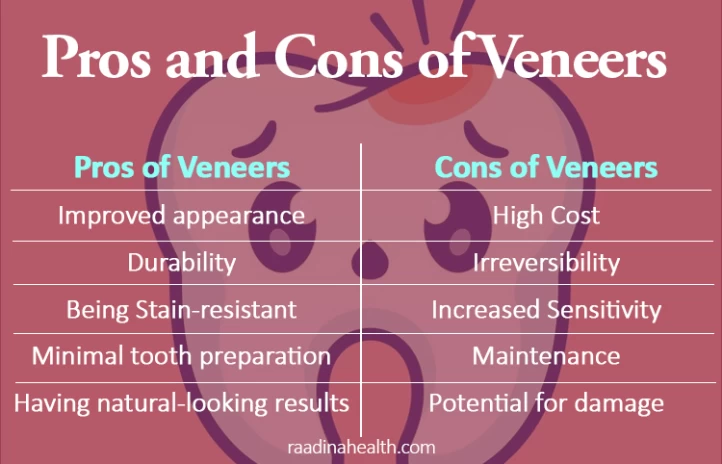
Can You Get Veneers on Decayed Teeth?
Veneers are typically not recommended for decayed teeth. Before getting veneers, it is important to address any decay or damage to the teeth. The decayed teeth would need to be treated and restored before veneers can be placed. In some cases, a dental crown may be a more suitable option for decayed teeth as it provides more coverage and protection. It is best to consult with a dentist to determine the most appropriate treatment for decayed teeth.
What Are the Potential Risks and Complications of Veneers?
While veneers offer numerous benefits, there are some potential risks and complications associated with this dental procedure. These include:
- Tooth sensitivity;
- Gum irritation;
- Tooth damage;
- Veneer detachment or fracture;
- Color mismatch;
- Allergic reactions;
How to Protect Your Teeth Under Veneers?
By following the below tips and maintaining good oral hygiene practices, you can keep your veneers clean and protect your teeth for years to come.
Brush and floss regularly
Maintain good oral hygiene by brushing your teeth at least twice a day and flossing daily. Use a soft-bristled toothbrush and non-abrasive toothpaste to avoid damaging the veneers.
Use a non-abrasive toothpaste
Choose a toothpaste that is gentle and non-abrasive to prevent scratching or damaging the veneers.
Avoid staining foods and drinks
Limit your consumption of foods and drinks that can stain your teeth, such as coffee, tea, red wine, and berries. If you do consume these items, rinse your mouth with water afterwards.
Avoid using your teeth as tools
Do not use your teeth to open packages, bite your nails, or chew on hard objects, as this can damage the veneers.
Wear a mouthguard
If you grind your teeth at night or participate in sports that could result in dental injuries, wear a mouthguard to protect your veneers and natural teeth.
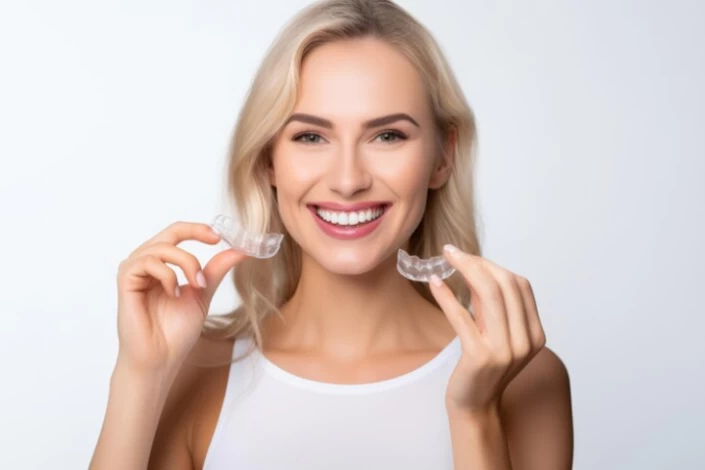
Visit your dentist regularly
Schedule regular dental check-ups and cleanings to monitor the condition of your veneers and ensure they are properly maintained.
Consider a night guard
If you grind your teeth at night, consider wearing a night guard to protect your veneers from excessive wear and damage.
How Can You Tell If Your Teeth Are Rotting Under Veneers?
It can be challenging to detect tooth decay or rotting underneath veneers because the veneers themselves can mask the underlying issues. However, some signs may indicate potential problems with your teeth under the veneers:
- Sensitivity: If you experience increased sensitivity or pain in the teeth covered by veneers, it could be a sign of decay or damage underneath;
- Discoloration: Dark spots or discoloration on the edges of the veneers may indicate decay or staining underneath the veneers;
- Gum inflammation: Swollen or inflamed gums around the veneers could be a sign of an underlying issue, such as decay or infection;
- Changes in fit or appearance: If your veneers start to feel loose, shift position, or show signs of damage, it could be an indication of problems with the underlying teeth;
- Bad taste or odor: Persistent bad breath or a foul taste in your mouth may be a sign of decay or infection underneath the veneers.
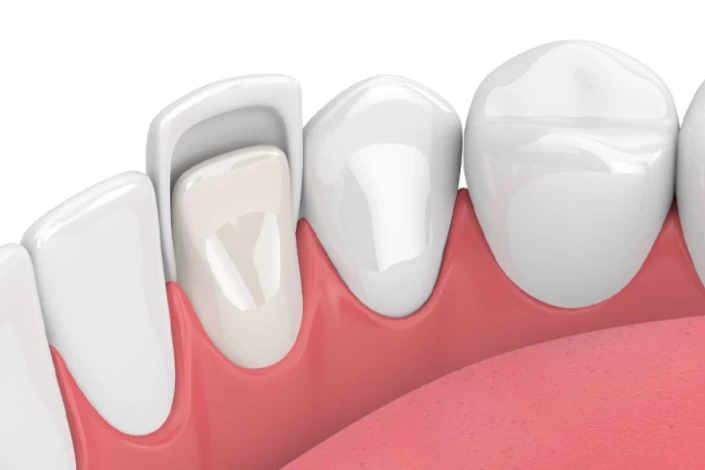
Why Iran to Get Veneers?
Iran has emerged as a popular destination for individuals seeking high-quality dental treatments, including porcelain and composite veneers. One of the primary factors that make Iran an attractive choice for getting veneers is the affordability of dental procedures compared to many Western countries. The cost of porcelain veneers in Iran is relatively lower, making it a cost-effective option for patients looking to improve their smiles without breaking the bank.
Moreover, Iran boasts a well-established healthcare system with modern dental clinics equipped with state-of-the-art technology and facilities. Dentists in Iran are highly skilled, experienced, and often trained internationally, ensuring that patients receive top-notch care and expertise when undergoing porcelain veneer treatment. The quality of materials used in dental procedures, including composite and porcelain veneers, is also on par with global standards, providing patients with durable and aesthetically pleasing results.
How Much Do Veneers Cost?
The cost of porcelain veneers in Iran can vary depending on several factors, including the dentist's experience, the quality of materials used, the number of veneers needed, and the location of the dental clinic. On average, the cost of a single porcelain veneer in Iran can range from $100 to $300 USD.
FAQs
Do veneers last forever?
Veneers do not last forever. On average, veneers can last between 10 to 15 years before they may need to be replaced or repaired. The lifespan of veneers can vary depending on factors such as oral hygiene practices, diet, habits like teeth grinding, and how well they are maintained. Regular dental check-ups can help monitor the condition of your veneers and ensure they are functioning properly.
Can you get cavities under veneers?
While veneers themselves are not susceptible to cavities, the underlying tooth structure can still develop cavities if proper oral hygiene is not maintained. It's important to continue brushing, flossing, and visiting your dentist regularly even with veneers.
Can veneers cause damage to your teeth?
In some cases, poorly fitted veneers or improper care can lead to damage to the underlying tooth structure. It's important to follow your dentist's instructions for caring for your veneers and maintaining good oral hygiene to prevent any potential damage.
Can veneers cause sensitivity in your teeth?
Some people may experience increased sensitivity in their teeth after getting veneers, especially if the enamel removal process exposes the dentin layer of the tooth. This sensitivity is usually temporary and can be managed with desensitizing toothpaste or other treatments recommended by your dentist.
Why do I experience throbbing pain after veneers?
Throbbing pain after getting veneers can be a common side effect, especially in the immediate days following the procedure. This discomfort is usually due to the sensitivity of the teeth and gums after the enamel removal process and the placement of the veneers. The throbbing pain may also be a result of the teeth adjusting to the new veneers.
Can veneers cause gum problems?
Properly placed veneers should not cause gum problems. However, if the margins of the veneers are not properly sealed or if there is plaque buildup around them, it can lead to gum irritation or inflammation. Good oral hygiene practices can help prevent gum issues with veneers.
Are there alternatives to veneers that do not require altering natural teeth?
If you are concerned about altering your natural teeth, there are alternative cosmetic dental treatments such as dental bonding or removable dental veneers that do not require permanent changes to the natural tooth structure. Your dentist can discuss these options with you based on your individual needs and preferences.

No reviews
Your comment